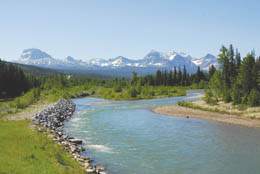
In the last two years, Lotic has completed 30 water rights consulting projects across 18 states. These projects involve market and water rights analyses, asset management plans, brokerage, and valuations for a variety of industry sectors. But in every project, our work focuses on the confluence of economic prosperity and resource conservation, or as we put it, where blue turns into green.
Blue represents the historic, one-dimensional view of water. For example, the early settlers who claimed water for irrigation hardly imagined another use for their water. Yet new uses have arrived and they are green. Green can mean many things—wealth, efficiency, or sustainability. To Lotic, green can mean profitably leasing water instream to protect trout habitat, reallocating water rights to maximize resource values through wetland and riparian mitigation banks, or increasing operational efficiency by selling conserved water to growing municipalities.
Currently, Lotic is working on three projects that further illustrate our vision of turning blue into green.
The Grass Valley French Ditch Company in Missoula, Montana, is challenged with maintaining its agricultural livelihood in the face of rapid urban growth. In response, Grass Valley is in the process of changing its water rights from their traditional irrigation and stockwater uses to a “marketing” use—a process that will offer more flexibility in water use and facilitate market exchanges. If granted, Grass Valley could lease or sell water to multiple buyers. The change would allow the ditch company to protect the remaining agricultural shareholders within the company, help finance maintenance and operations, and offer a source of contract water to mitigate future growth in municipal water use.
Lotic is also leading a new charge in the emerging wetland and riparian mitigation banking market. Mitigation banks help restore wetland and riparian habitat and receive “habitat credits” in return. When new development destroys wetland habitats, federal law requires that developers offset their impact. In many cases, the offset occurs through the purchase of credits from a mitigation bank. In the East, where water is abundant, finding mitigation credits is relatively easy. In contrast, western water is scarce and rights are defined and enforced based on more than a century of prior usage.
To aid in the development of these mitigation banks, Lotic provides water rights inventory services and asset management plans, securing valid water rights for a mitigation bank. This increases the water bank’s return on investment and decreases its legal risk within the state’s existing water law. Lotic is also pursuing the first-ever transformation of a water right from an irrigation to a riparian use for a proposed riparian mitigation bank. If successful, this will modify how we view and administer instream flows across the West.
Finally, Lotic helps individuals and companies reduce their water footprint—a measurement of water consumed during production. In 2010, Lotic brokered some of the first water restoration certificates for Big Sky Brewing Company, the largest brewery in Montana. This project allows the brewery to leverage water markets to restore more than 4 million gallons of water over three years to a dewatered Montana stream where it provides the greatest social and ecological gain. The emergence of water footprinting—and the secondary water rights market it creates—illustrates just how green water has become.
Water rights are no longer one-dimensional pieces of paper—they are complex assets that should be maximized through the emerging markets of the West. This recognition is what Lotic calls turning blue into green. It is the work we enjoy and the passion we will continue to pursue.



